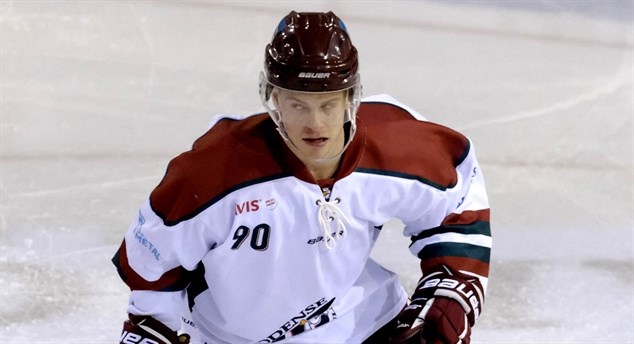
His grandfather wore #9, Robin Sterner played with #90, his year of birth, for the Odense Bulldogs at the 2017 IIHF Continental Cup Final. Photo: Max Pattis
Robin Sterner loving the hockey life in Denmark
When a hockey star quits the ice, a career ends. But sometimes, a dynasty can begin.
In the case of the Sterner family, it’s Robin Sterner, grandson of Swedish NHL pioneer Ulf Sterner, who is keeping up his family’s hockey tradition.
While Robin Sterner’s father wasn’t a hockey player, for him there was basically no way around the coolest sport on earth. Not only because he’s the grandson of the first European-trained player to play in the NHL but even more because he grew up in Karlstad, one of Sweden’s most famous hockey towns.
“Everybody in Karlstad played hockey. I played other sports too like football, but in a town like that hockey is the biggest thing to do. That’s what you want to do. It was the most fun sport,” he said. Sterner went through the junior system of Farjestad Karlstad, and debuted for the club in the top Swedish senior league as a 19-year-old in 2009/2010.
A year later, Sterner appeared in 14 games with the senior team in the playoffs when Farjestad Karlstad became Swedish champion and he got to put on the traditional golden helmet.
Surprisingly, the younger Sterner was the first family member to do so. Although his grandfather had a great career in Sweden between the ‘50s and ‘70s, winning the golden puck as player of the year in the league (1963), the World Championship in 1962, the scoring title at the Olympic tournament in 1964 and a spot on the New York Rangers’ roster in 1965, the IIHF Hall of Famer actually never became Swedish champion.
For Robin Sterner, carrying his name has never been an issue.
“People asked more about my grandfather more before than now, like older people who remember him as a player. But for people I play with or against that was long before their time. It’s a long time ago but he sometimes showed me how to shoot the puck when I was a kid,” Sterner said about his grandfather.
Times are different too. During his grandfather’s days, body-checking was forbidden in the offensive zone in Sweden and in international hockey. That made adjusting to hockey in North America difficult for the Swede with the fine hands. He had good numbers with the Rangers’ farm team but only got four games in the NHL, the first one almost exactly 52 years ago to this day, without scoring points. The season after he continued his career in Sweden.
For Robin Sterner body-checking is very well part of the game. He’s a two-way forward who has grown up with the physical game. And when leaving the Swedish Hockey League, he got a new role where he scores more often. Last season he played for Lorenskog in Norway where he had 19 goals and 21 assists in 57 games en route to the final the team eventually lost.
For this season he moved to Denmark where he plays for the Odense Bulldogs that recently competed in the 2017 IIHF Continental Cup Final.
“Denmark and Norway are similar in hockey. It’s a bit different than in Sweden where the hockey is more structured. It’s freer. It’s still a good level, there are a lot of imports in those leagues. It’s been fun to play there,” he said. “The SHL is a better level for sure, you have to pay for your mistakes. But the leagues are getting better. It’s taking steps every year.”
Communicating abroad is no issue for him since the languages are similar. “After a few weeks you can understand it,” he said.
“Hockey life in Odense is great. It’s a good hockey culture with good fans. It’s not like that in every place in the league but Odense is a great place and a good city. You could see it at the Continental Cup where we had great fans travelling there.”
What is more different is the lifestyle of a hockey player. While he’s hired as a full-time pro, many of his Danish teammates are not in the same situation. That changes the daily routine.
“In Denmark and Norway the local players go to work,” he explained. “That was not the case in Sweden where we were full-time pros where we practise in the morning. Now we practise in the afternoon and a lot of guys have to work or go to school. But the imports normally don’t work beside hockey.”
The Odense Bulldogs are currently third in the Danish Metal Ligaen. The club has the top-two scorers of the league, Canadians Dale Mitchell and Tony Romano. During the Continental Cup Sterner played on the second line. He scored one goal en route to a bronze-medal finish.
The tournament was wide open for the team until a 4-2 loss to Kazakh champion and eventual silver medallist Beibarys Atyrau on the last day. Goal scoring was an issue for the Bulldogs at that level.
“It’s tough to win a game if you don’t score,” he said and also noted that they had a less experienced team than others. Their average age was 23 while that of the two teams ranked ahead was between 30 and 31 respectively.
For the 26-year-old, who represented Sweden in exhibition games at junior level, the season continues in league play where Odense aims at qualifying for another international experience after their recent participation at the Continental Cup Final in Italy.

